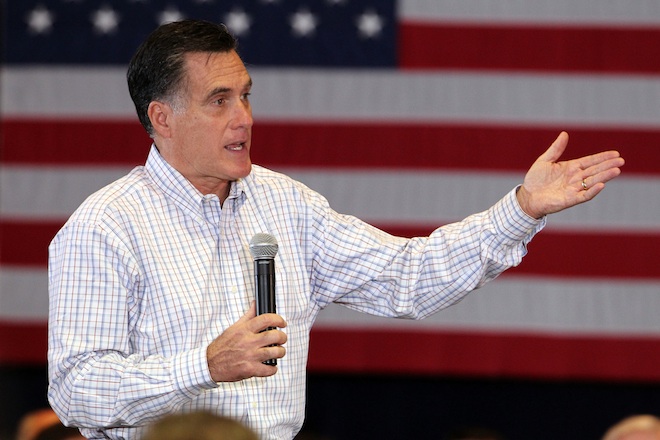On CNBC Wednesday morning, Mitt Romney was given a breather from political questions about his appeal to GOP primary voters and allowed to discuss substance. When it was all over, he probably wished it had been the other way around.
Brushing back a question about independent analyses, which conclude his plan will blow a huge hole in the budget, Romney accidentally hinted at a key fact about his fiscal policy: he left out all the hard stuff.
“I think it’s interesting for the groups to try and score it because it can’t be scored because those kind of details have to be worked out with Congress and we have a wide array of options,” Romney said.
To the extent that this is true, it’s because Romney’s been intentionally vague about the politically challenging parts of his plan.
“Because Gov. Romney has not specified how he would increase the tax base, it is impossible to determine how the plan would affect federal tax revenues or the distribution of the tax burden,” noted the Tax Policy Center, in their analysis of his proposal.
In a narrower, heavy-on-the-Beltway-jargon sense, Romney is correct. In Washington parlance, a “score” is a cost-estimate provided by official government analysts of fully fleshed out legislation — not a preliminary analysis of a policy white-paper.
But think tanks can get very close to the mark when candidates and lawmakers put forward plain-language proposals, as Romney has. And contrary to his claims, what they say is that his plan — to give every taxpayer a 20 percent rate cut, eliminate the estate tax, and exempt investment income — will dig the government into a huge cash hole he’ll have to fill with unpopular cuts to federal programs like Medicare, and by eliminating popular tax benefits. That is, if he wants to make good on his promises to keep defense spending high, and to improve the country’s fiscal imbalances.
Romney glossed over this.
“[W]e’re going to cut the top marginal rate across the board by 20% and at the same time, we’re going to limit the deductions and exemptions to pay for most of that,” Romney said. “And then additional growth will pay for the rest of that such that our plan does not increase the deficit. And then combine that with the savings I just described with Tom in terms of cutting back several government programs or eliminating some of those programs and we finally get america to a balanced budget.”
This rests on the widely disputed assumption that his tax cut plan will spur enough economic growth to significantly offset its own costs. And it lacks any specificity about what popular programs and tax benefits — Medicare? The home mortgage interest deduction? — he plans to cut or eliminate to offset the massive revenue reduction.
Absent the tax reforms Romney’s promised, but not specified, “TPC estimates that on a static basis, the Romney plan would lower federal tax liability by about…$480 billion in calendar year 2015,” compared to current policy. It’s probably impossible to fill a gap of that size — which calls into question his revenue neutrality claim.
And his other claim — that the plan doesn’t make the tax code less progressive? Also dubious.
According to the liberal-leaning Center on Budget and Policy Priorities, “even if the tax changes themselves managed not to make the tax code less progressive — a goal that the Romney plan would be hard-pressed to achieve, given its proposals to cut tax rates across the board, abolish the estate tax and the AMT, and retain the current low rate for capital gains — spending cuts of the magnitude needed to offset the revenue losses would necessarily have to hit hard at Medicare, Medicaid, and/or Social Security and at programs for people with low or moderate incomes. It is hard to imagine that the net effect would not be to shift income up the income scale and widen after-tax income inequality.”
To boil it all down, the federal government by and large spends money on national security, popular programs for the poor and old, and on broader benefits via expenditures in the tax code. Romney wants to shrink the pool of money dramatically, without cutting spending on that first big category. That’s consistent with the conservative movement’s goal of “starving the beast” and phasing out domestic support programs. But their leading candidate won’t say that’s what he plans to do.






